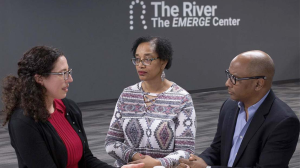Cancer Prevention
GILDA SUITER, 54, OF DURHAM, NORTH CAROLINA, struggled with gastroesophageal reflux disease, known as acid reflux, for several years.
Two years ago, her doctor recommended that she take a urea breath test—a non-invasive diagnostic test to detect a common bacterium called Helicobacter pylori (H. pylori). He thought H. pylori might be causing her stomach issues.
The test is based on the ability of the bacterium to convert urea to carbon dioxide. Patients exhale into a balloon-like bag, and then drink a lemon-flavored solution that contains urea. After 15 minutes, they give a second breath sample to test for an increase in carbon dioxide. Suiter did not follow her doctor’s advice.
“I just did not want to drink that stuff. That was a real drawback for me, and I brushed it off,” she says.
Last year, Suiter got another chance to take the test—at her church. Meira Epplein, PhD, a cancer epidemiologist at Duke Cancer Institute (DCI), and Sydnee Crankshaw, MPA, research program leader at DCI Cancer Control and Population Sciences, visited the River Church in Durham as part of the Durham Initiative for Stomach Health (DISH). Epplein, associate professor in the Department of Population Health Sciences, started this project to help prevent stomach cancer.
“Infection with H. pylori is the leading risk factor for developing stomach cancer, and eradicating it can reduce the risk of stomach cancer by 50 percent,” she says.
After hearing Epplein speak, Suiter decided to do the urea test.
“They explained what H. pylori is and how it affects people in the African American community, and my daughter encouraged me to participate in the study,” Suiter says. “Many of us are not aware that the test can help detect issues in the stomach that may lead to stomach cancer.”
Suiter did have H. pylori in her stomach. She shared the diagnosis with her primary care doctor and asked to be treated. Her doctor administered a 14-day antibiotic regimen. Last November, Epplein and her team retested her and found that the bacteria was gone.
“I’m glad I did that,” says Suiter.
Now she shares her experience with family and friends and encourages them to get tested for H. pylori .
Higher Death Rates Among Black Men
Infection with H. pylori is very common. About 50 percent of the world’s population is infected with the bacterium, Epplein says. The bacterium is transmitted person-to-person by saliva or spread by fecal contamination of food or water.
In the United States, H. pylori infects 30 percent of the overall population. However, it is believed that 50 percent of African Americans, Asian Americans, and Hispanic Americans are infected.
“People of color are two to three times more likely to be diagnosed with stomach cancer than whites,” says Epplein, who comes from an Ashkenazi (European) Jewish heritage, a population that is also more likely to be infected with H. pylori and to be diagnosed with stomach cancer.
Her great-grandmother died of stomach cancer.
“Stomach cancer is the sixth-leading cause of death from cancer in African American men, and it accounts for the greatest disparity in death rates from cancer between African Americans and whites,” she says.
Epplein, who earned a master’s degree in international studies witha focus on China, worked and traveled in China prior to pursuing her academic career. She saw firsthand health disparities between wealthy communities in Beijing and poor communities in the countryside, and that fueled her passion to reduce health disparities and help underserved populations.
She capitalized on community outreach efforts that DCI researchers Steven Patierno, PhD, and Nadine Barrett, PhD, developed with the River Church in Durham in the past two years, and found a nontraditional way to recruit participants to her study. Epplein partnered with church leader Pastor Ronald L. Godbee to conduct the study and administer H. pylori testing at the church rather than at a clinic, to make it more accessible for participants.
Epplein and Crankshaw participated in several Sunday morning services. Godbee invited them to the stage to introduce the study to the congregation and talk about the importance of H. pylori testing.
“He put his arms around us and said: ‘I trust these people. They really care,’” says Epplein. “The warmth of the community was really wonderful, and they were amazingly open to us.”
A Welcoming Community
Godbee feels that promoting health and wellness is part of his role as a spiritual leader.
“This study provided us an opportunity to secure the health and well-being in our congregation,” he says. “As a pastor, my major concern is not just getting people to the afterlife, but also securing them in the present life and assuring the longevity of the people that I love.”
Epplein recruited 92 congregants to participate in the study. In May 2018, she and her team set up a study event at the church. The participants were asked to complete an extensive health questionnaire, give a blood sample, and take the urea breath test.
Epplein found that 25 percent of the participants (23 people) were H. pylori positive.
"As a pastor, my major concern is not just getting people to the afterlife, but also securing them in the present life and assuring the longevity of the people that I love.”
Pastor Ronald L. Godbee



